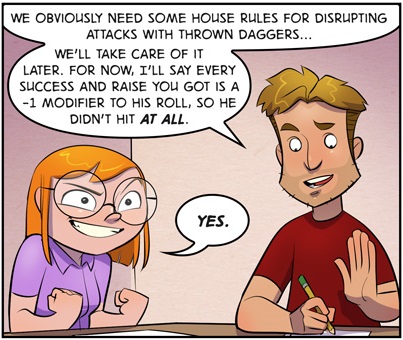On this week’s page, Lily is once again trying to do a specific action that’s not covered by the rules. Nadav remarks this calls for a house rule – as the saying goes “Use it once, ruling on the spot; use it twice, ruling is forever”. Or something, idk.
 However! This is not just any house rule. Because this rule will mostly be used by a single player, it’s important to keep it balanced, that is, making sure it doesn’t have too much of an impact on the game compared to the options presented to the other players. If throwing a knife at something becomes super-useful in creating a variety of outcomes, the rule is essentially rewarding one player – the one who chose to have a high Throwing – more than others. Imagine you could use Persuasion to talk your enemies into hurting themselves or convince the lock to open – Persuasion becomes the best skill in the world, at the expense of all the rest.
However! This is not just any house rule. Because this rule will mostly be used by a single player, it’s important to keep it balanced, that is, making sure it doesn’t have too much of an impact on the game compared to the options presented to the other players. If throwing a knife at something becomes super-useful in creating a variety of outcomes, the rule is essentially rewarding one player – the one who chose to have a high Throwing – more than others. Imagine you could use Persuasion to talk your enemies into hurting themselves or convince the lock to open – Persuasion becomes the best skill in the world, at the expense of all the rest.
In order to maintain such balance, consider the following guidelines.
Have a price – Lots of rules allow you to do cool stuff but demand a price. Want to have more than one action on your turn? Sure, just take -2 for each one. Simply rolling the die is a form of a risk, because you might fail. The greater the danger, the more game-changing the result can be.
Make it contingent upon uncommon circumstances – Again, lots of rules are already doing this. Want to get +4 to attack and damage? Sure, just hide first, and make sure your enemy isn’t expecting an attack. The less common the requirements, the more game-changing the result can be.
Involve the player – “Personal” house rules should always be created along with the player they’re being customised for. Most players want to play “fair” – they don’t want to succeed every time, they just want the rules to work along with what they imagine they character should be able to do. Even most power players don’t want to be given an ability that is too useful – there’s no point in just being handed the +5 Sword of Game-Winning. You need to earn it.
Keep it open – It’s highly unlikely that your first or even second version of the house rule will hold water. It’s probably not as cool, useful or streamlined as you imagined. Consider the first 2-3 sessions after creating the rule as playtest, take feedback from the players (and if you’re the player whose customising the rule for yourself – take feedback from the GM on how interruptive it feels), and just like you do with the rest of the rules, always keep it open to changes. The game is dynamic, maybe in two or three Ranks, the rule will start to feel overpowered or underused.
The Strength Fruit
Here’s an example from the 50 Fathoms game I’m running for Aviv, Ev and Dassi. We’ve decided to make it more anime, less wenches and dysentery, so I’ve added character concepts and elements from the pirate anime One Piece. Chief among these elements are the Devil Fruits – Fathom Fruits in our world – which give weird superpowers to the people who eat them.
Because our PCs might decide to eat one of these one day, I created a fruit for each of them. Fathom Fruits powers stay forever, and can never be changed or replaced – so in essence, I’m creating a personalised house rule for each PC.

Six, Telemachus and Bella
Let’s focus on Aviv’s character, Bella Bong, who’s a brutish, happy-go-lucky Masquani (like human, only more colourful). She’s large and strong, and so it seemed fit to create a Fruit that makes her even more so.
 Strength Fruit: Allows you to eat a lot, and store a number of “strength” points up to your Rank, as a big belly. Each point gives +1 on Vigor checks vs fatigue. You can spend points to “hulk”, rolling Boost Strength using Vigor (So you can gain a Strength die, or more with a raise, as an action); the points your spend are added as a bonus to the roll.
Strength Fruit: Allows you to eat a lot, and store a number of “strength” points up to your Rank, as a big belly. Each point gives +1 on Vigor checks vs fatigue. You can spend points to “hulk”, rolling Boost Strength using Vigor (So you can gain a Strength die, or more with a raise, as an action); the points your spend are added as a bonus to the roll.
There are lots of costs and contingencies here. You can gain lots of Strength, but it takes an action to “hulk”. Also, you’re losing this point from your bonus to negate fatigue. This might not seem like much, but our PCs have already found themselves in a situation where they had to go through a desert for 4 days, after having a big fight. The effect is also very obvious, even the passive one (big belly), encouraging fun interactions and forcing some new considerations whenever the subject of stealth or subterfuge arises. Finally, because it’s based on your Rank, for the first few adventures it’s not all that different from just being able to cast a slightly modified Boost Strength on yourself (and only on yourself), which is a Novice power. Things might change later on (by Veteran, she might be able to gain 3-4 dice of Strength with a single roll), but by then, the other players will probably have similar abilities, to say nothing of the NPCs they’re going to face.



